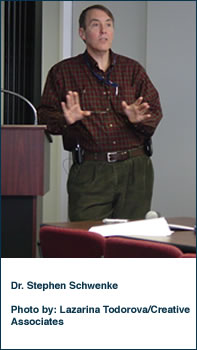[vc_row][largeur vc_column = »1/1″][vc_column_text]
Ethical Leadership is at the Core of Improving Lives
[/vc_column_text][/vc_colonne][/vc_row][vc_row][largeur vc_column = »2/3″][vc_column_text]
Docteur. Stephen Schwenke, Creative’s Team Leader of Civil Society and Governance, says greater emphasis should be placed on ethical leadership in development, the core of good governance and an important means for improving lives in the developing world.
En général, development practitioners seek to achieve good governance by applying management expertise – technical expertise and capacity building, providing services and other necessary functions that allow effective governance, Schwenke says. But he adds that while making the governance “machine” run efficiently is essential, what the “machine” is there to do must be considered. Implementing technical activities and balancing budgets are only a beginning because, “governance isn’t the goal, it is the means to the goal of human well-being.”
Schwenke’s current concentration on governance focuses primarily on ethical leadership. Though he admits that the means to good governance must begin with security as a baseline along with required technical and administrative functions, the concept of ethical leadership to transform governance is ripe to become integral to USAID’s and other donors’ models of development.
“Governments have to perform, provide services, they have to provide duties,” Schwenke says. “For many people in development that’s where it stops.”
Schwenke believes that a prerequisite to making development work is identifying, supporting and training ethical leaders. Decades of economic development and civil society building efforts have too often tackled improvements in administration and service delivery while overlooking the larger shared vision of a good society, and the political deficiencies that often underlay poor ethical performance, such as endemic corruption that is costly to both nations and individuals.
“Realists dismiss ethics, because ethics is irrelevant to power. But leadership is a moral relationship,” Schwenke said. “Why don’t we talk about leadership, why are we more comfortable talking about budgets?” Schwenke argues for opening the door to a regular moral dialogue about the values that underpin development, and the role of leadership in driving a shared vision that is anchored in moral values and ethical performance.
Schwenke’s work and that of other ethicists calling for a new paradigm in the way we look upon leadership is gaining ground. There is room for optimism because development practitioners and agencies such as USAID and the World Bank are already sponsoring conferences and questioning the qualities of good leadership, and how best to foster good leadership. USAID is now supporting a pilot project at the American University in Cairo to help identify young people who have leadership aspirations, talent and motivation to prepare and train them for leadership. The World Bank is funding Creative in assisting professional associations in East Africa to implement practices of ethical leadership in the professions.
The challenge that development faces today is how to characterize and define leadership in a more robust way, particularly as a moral resource for development. Par conséquent, ethical leadership is transformational and visionary. A transformational leader captures a common sense of the common good and uses influence or persuasion to empower followers and direct them toward a common goal. Schwenke differentiates between a leader, manager and ruler. A manager, he argues, is a transactional leader, one who is content with the status-quo and is concerned with how to get people to work to get a transaction done as efficiently as possible. A manager, en bref, is a technocrat who is comfortable with the system and resists major changes. A ruler, d'autre part, is someone who is the antithesis of a leader because “a ruler is a person who is indulging their ego at everyone else’s expense,” Schwenke said.
Schwenke doesn’t shy away from challenging the donor community’s existing notions for achieving good governance as too vague. He notes that USAID uses language that speaks of “political will” but questions whether a concern for “political will” on its own will result in promoting ethical leadership without first answering such questions as whose political will, and political will to do what and for whom?
“If pursuing political will, are we trying to put in place leaders, managers or rulers?” Each brings a different perspective and a different set of skills and expectations to the job,” Schwenke said. “If you have a transformational leader, she will have a different sense of what political will is about, her vision and her ability to share that vision with others is critical to her success. This is different from managers whose political will is limited to being efficient and that’s about it; that’s not a very expansive political will.”
Along with other ethicists and development theorists such as Paul Collier, Schwenke suggests that what is needed is a governance charter that explicitly defines the moral and ethical performance expectations of leaders so that everyone is on the same page. Writing down the characteristics of an ethical leader provides a blueprint for assessing performance and determining if a leader is living up to expectations of governance and is respecting both the spirit and the rule of law. “Then, the question of what constitutes ethical leadership will no longer be in a grey area. We can then ask if leaders are treating people’s development aspirations honestly, and governing does not become a means to some other end,” Schwenke said.
—Alexandra Pratt[/vc_column_text][/vc_colonne][largeur vc_column = »1/12″][/vc_colonne][largeur vc_column = »1/4″][vc_widget_sidebar sidebar_id= »barre latérale-primaire »][/vc_colonne][/vc_row]